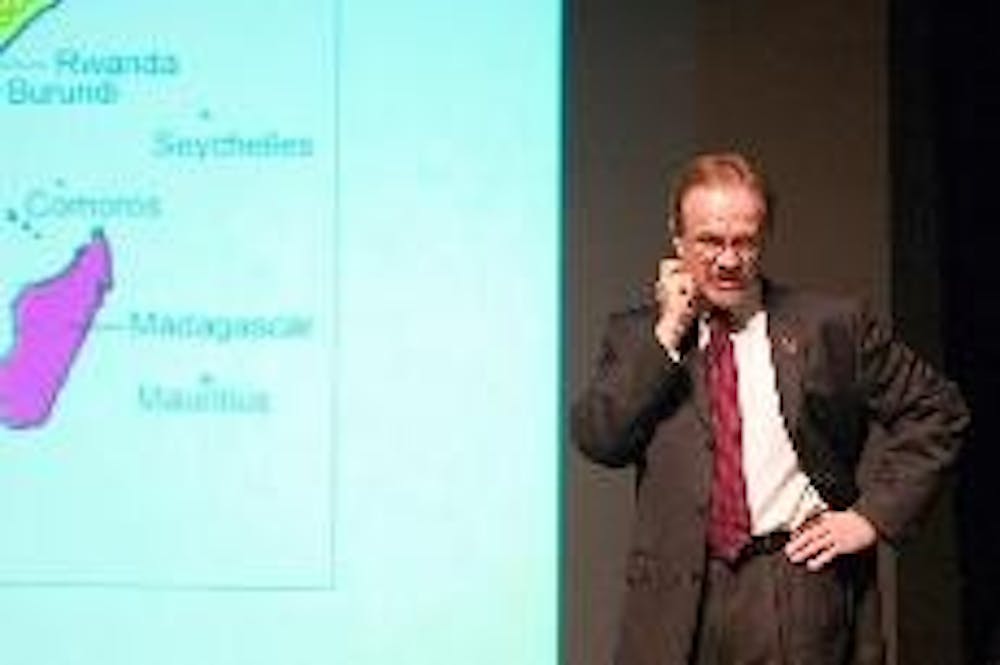
The director of Southern African Affairs for the U.S. Department of State speaks about stabilizing southern Africa Monday afternoon in Hall Auditorium. (Jeffrey Creech)
Stability. That's what Dan Monzena, director of Southern African Affairs for the U.S. Department of State, explained is in the world's collective best interest for southern Africa, on Monday afternoon to an audience in Hall Auditorium.
"Our best interests lie in a peaceful, stable, democratic, healthy and prosperous Africa," Mozena said.
Mozena came to Miami University through the student-run African School Advancement Program (ASAP).
Monzena spoke on the U.S. interest and current policy in southern Africa, touching on the significant humanitarian, democratic and economic issues prevalent in the region.
Key in Monzena's lecture were the topics of HIV and AIDS. Monzena said that Africa is the front lines in the worldwide battle against the deadly virus, so Africa - and southern Africa in particular - has never been more important.
AIDS, Monzena said, is destroying southern Africa.
As he walked about the stage, throwing his hands into each point, Monzena reminded his listeners that in southern African alone, 42.6 percent of the adult population has HIV/AIDS - with Botswana having the lowest life expectancy in the world. It may be easy to speak of AIDS in the abstract, Monzena said, but we should never forget how personal the disease is.
Monzena also talked about Washington D.C.'s "transformational diplomats" and their role in preventing political corruption and sanctioning oppressors in Africa. He mentioned the immense investment the U.S. holds in southern Africa, as well as the benefits of the Millennium Challenge Account, which was established by the Bush administration in 2004.
"(The Millennium Challenge Account) brings serious resources to countries that have shown, objectively, that they are serious about developing (their economies)," Monzena said.
Yet problems exist even in the most stable of southern Africa's democracies - including terrorism networks, high unemployment and a crime rate in southern Africa that is ten times that of the United States. With challenges such as these, it is no wonder southern Africa has captured the world's attention, according to Monzena.
Enjoy what you're reading?
Signup for our newsletter
Meredith Poff, president of ASAP, explained the special importance of Monzena's visit.
"We are all connected on a global level, and the actions we take today will have a profound effect on the world of tomorrow," Poff said.
Poff also said the global environment even includes Oxford, Ohio.
"It is not difficult to see how we are connected to China, Japan, India, and Taiwan: You need not look further than the tags on your clothes or the foods we eat," Poff said. "We can all benefit from countries outside the U.S."
After being in touch with the Department of State for some time, ASAP representatives chose Monzena to visit Miami because of his impressive career, which includes many years spent in the heart of southern Africa and his ability to communicate the plight of people in southern Africa.
Monzena's speech also closely correlates with ASAP's primary mission of advancing education and increasing the awareness of world issues. ASAP will continue to host lectures and dinners throughout the year, as well as their annual fundraiser, which will collect school supplies to send to schools in sub-Saharan Africa.




